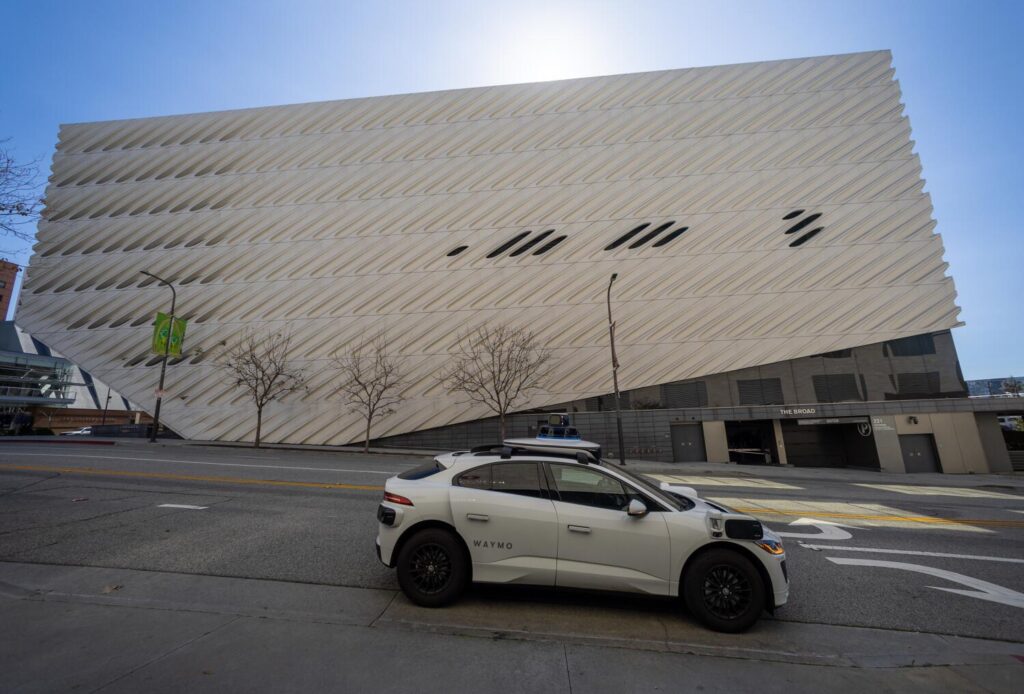As three key players vie for dominance, the race to put driverless taxis on roads across the country is heating up.
Waymo, owned by Google’s parent company Alphabet, already offers paid autonomous rides in a handful of cities, including San Francisco and Los Angeles. Amazon’s robotaxi effort, known as Zoox, opened a new production facility in the Bay Area this week. The company has been testing its unique pill-shaped vehicles in California and Nevada since 2023.
Meanwhile, in Austin, Texas, Elon Musk just started testing driverless Teslas with the hopes of launching a commercial service soon. Musk unveiled a prototype for Tesla’s Cybercab late last year, touting his vision for an autonomous future and “an age of abundance.”
The arrival of self-driving tech could eventually affect society as much as the internet and smartphones did years ago, some experts predict. With Waymo leading the way and Tesla and Zoox trying to catch up quickly, a new status quo could be on the horizon, said Karl Brauer, an analyst with iSeeCars.com.
“Tesla has tried to catch up, and Zoox is a more recent competitor that’s hoping to be a serious player,” he said. “Waymo has been slow and steady and, as a result, is winning the race.”
According to some industry insiders, the U.S. is about 15 years from seeing widespread use of robotaxis, Brauer said. While Waymo taxis have become a common sight in the cities where they operate, weather conditions and charging infrastructure still limit their expansion.
On Wednesday, Waymo expanded its service area in Los Angeles County, where its vehicles now roam an area of more than 120 square miles. The company also increased its service area in San Francisco, expanding access to suburbs and Silicon Valley.
Days after Waymo’s announcement, Zoox opened a 220,000-square-foot facility in Hayward, Calif., that the company says will be able to produce 10,000 robotaxis per year. Zoox is preparing to launch its public ride-hailing service in Las Vegas and San Francisco this year.
Unlike Waymo vehicles, which are retrofitted Jaguars, Zoox is developing a purpose-built taxi with no steering wheel or gas pedals.
Zoox also has a manufacturing plant in Fremont, Calif., where the company develops its test fleets of retrofitted Toyota Highlanders. Tesla has a manufacturing facility in Fremont as well.
Musk has promised for years to deliver autonomous vehicles and a robust ride-hailing service. Lawmakers in Austin requested this week that he delay the rollout of his service in the city.
Tesla, Zoox and Waymo are the three remaining major U.S. companies in what was once a more crowded field, Brauer said. General Motors’ autonomous taxi company Cruise suspended operations in 2023 after one of its vehicles struck and dragged a pedestrian in San Francisco. Last year, Uber and Cruise announced a partnership that could put Cruise vehicles back on the road.
A company called Argo AI, backed by Ford and Volkswagen, was also developing driverless technology until it shut down in 2022.
The continued expansion of robotaxis depends on safe and successful testing, Brauer said. There have been several incidents related to Tesla’s Full Self-Drive mode, a technology currently available but still in development. Waymo has issued recalls of some of its vehicles on multiple occasions.
“If there’s a tragic result for any of these three companies during the testing and development process, it would likely slow down the entire industry,” Brauer said.
Content shared from www.latimes.com.

